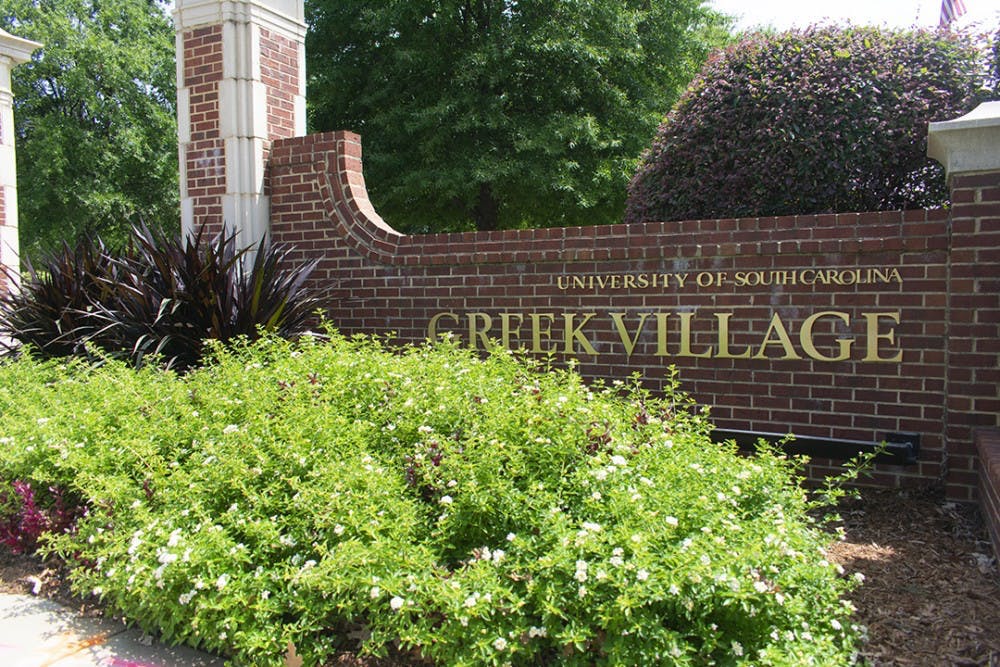The ongoing COVID-19 pandemic, as it has with most other aspects of university life, has ended most Greek life events for the spring 2020 semester. All Greek life members living on campus, such as in sorority or fraternity houses, have been sent home, thrusting them out of their tight-knit communities.
Delta Zeta member Ansley Hagenburger was one of many affected by on-campus housing closures.
“I was having a conversation with my mom, like, 'You're my mom, and I'm not the same with you as I am with my friends,'” the fourth-year social work student said. “Especially when you live with 30 other women, it's a big change to go from being around people all the time to, then, you're by yourself all the time."
Hagenburger is graduating this semester, meaning she, like other seniors in Greek life and the university as a whole, will be missing out on many of her sorority’s events that commemorate graduates’ times at USC.
“Right until the end, you know, you don't look back and think about it, but then you do, and not being able to have outlets to express what that feels like is troubling, I guess, just because you don't really know what to do with what you feel,” Hagenburger said.
The COVID-19 pandemic has made logistics difficult for the leadership of Greek life, too. Joseph Boyd, president of the National Pan-Hellenic Council, the council for historically African American fraternities and sororities, said recruitment usually relies on in-person presentations by new members at the end of each semester.
“Idealistically, anyone seeking to join a Black Greek Letter Organization hasn’t told anyone outside of members of the organization that they're interested in,” Boyd, a third-year dance education student, said. “New member presentation is something that's very important because it's like the big reveal, and it's the big announcement.”
The in-person presentations, known as probates, are where friends and family of new members gather to celebrate the entrance of new members into the organization.
Rachel May, a third-year exercise science student and president of the College Panhellenic Association, said she also foresees potential difficulty in obtaining new members.

"Orientation is a huge way that the university brings in students, and Greek life gets in touch with a lot of students, and so there's definitely a concern about what our numbers will look like in the fall, like bringing in people,” May said.
The College Panhellenic Association encompasses all of the sororities with houses in Greek Village.
To combat these changes brought about by the coronavirus, Greek life is adapting.
“A big part of Greek life is in-person events. That's kind of, like, the main aspect of what we're doing all year long, multiple times a week, so chapters have really been trying to find ways to connect members,” May said.
From pen pals to yoga sessions over Zoom, different chapters have employed a variety of methods to keep their organizations functioning as regularly as possible.
“I can say that chapters, of course, like within my organization and in other organizations, have come up with different ways to present their new members,” Boyd said, adding that some chapters have turned to video platforms such as Instagram Live as a way for new members to present themselves.
Even small measures can carry significant meaning, according to Hagenburger.
“For me it's just been texting people, just checking in, see how they're doing; and both, you know, in the midst of everything and just like, ‘I miss you’ kind of thing. The same way as everybody else, really,” Hagenburger said.
Greek organizations have also tried to keep up philanthropic efforts during the pandemic. The College Panhellenic Association has donated $4,000 to the university’s COVID-19 relief fund and provided COVID-19 relief grants for association members.
“A lot of people even who are still in Columbia work in the restaurant industry, or just on-campus jobs that are all now closed. So, just being able to give back to the Panhellenic community in that way was something that, as an executive board, we felt really passionate about,” May said.
Additionally, the Interfraternity Council, a collection of 20 on-campus fraternities headed by the president, a third-year accounting and finance student Brice Talley, gave up member refunds in order to donate $12,000 to COVID-19 relief.
“During this difficult time, our member fraternities wanted to give back to the community by voting to allocate any dues that were not used this semester to support their peers at the university and those serving on the front lines to combat COVID-19,” Talley said in a press release.
Hagenburger emphasized the significance of staying involved through this time.
“It's so important to be reaching out to your community and your sisters and everyone else who can walk with you,” Hagenburger said.

